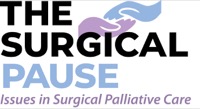
This year’s symposium coincided with the 20th anniversary of the first meeting of the Surgical Palliative Care Task Force (the precursor to the Committee on Surgical Palliative Care), which first convened in Chicago, on Sept. 10, 2001. Since the initial meeting, the field of surgical palliative care, defined by Geoffrey P. Dunn, MD, FACS, as “the attention to suffering in all of its manifestations of the patient and the family under surgical care,” has continued to develop and mature.
According to the American Board of Surgery, there are currently 75 surgeons board certified in hospice and palliative medicine, with several more enrolled in a one-year fellowship, and several enrolled in the fellowship application process. There are also many surgeons who routinely integrate palliative medicine principles into their surgical practice.
The following are the presentations from the meeting:

- Joseph A. Lin, MD, presented his abstract titled “Development of a Primary Palliative Care Vertical Curriculum for Surgery Residents.” The curriculum spans all five years of residency and is modeled after surgical training, with graduated complexity that includes learning both basic and advanced palliative care skills and then eventually learning how to teach these skills to junior residents.
- Halle Ellison, MD, FACS, discussed her abstract, “Undergraduate and Graduate Medical Learners’ Reflections on a Palliative Care Rotation” and reflected upon five themes—empathy, humanism, challenge, meaning and transformation—that emerged through written narratives provided by the learners. Dr. Ellison concluded that “a palliative care rotation helped learners to become better communicators and more fully connect with patients and their families” and postulated that the rotation “may help to counter the decline in empathy that often occurs during medical education.”
- Erin A. Strong, MD, MBA, MPH, presented “Palliative Care Specialty Consultation in Patients with Peritoneal Carcinomatosis undergoing CRS/HIPEC with Palliative Intent.” The purpose of the study was to evaluate the incidence and timing of palliative care consultation in patients undergoing palliative cytoreductive surgery and/or hyperthermic intraperitoneal chemotherapy, and concluded that “the ideal timing for palliative care consultation at a tertiary cancer center would be at the time of referral or immediately after the first specialty oncology visit.” Dr. Strong also suggested that “high-risk anesthesia consults could serve as a trigger event if a palliative care consultation has not already occurred.”
- Caitlin Hodge, MD, MPH, presented “Association Between Cancer Diagnosis and End of Life Wishes,” a pilot project using the Five Wishes document and patient interviews to compare end-of-life wishes between patients with cancer receiving treatment for cure, patients with metastatic disease undergoing treatment and patients who are no longer receiving treatment.
- Lastly, Hiren V. Patel, MD, PhD, discussed “Factors Associated with Palliative Intervention Utilization in Metastatic Renal Cell Carcinoma.”
The symposium concluded with a brief tribute to Robert A. Milch, MD, FACS, who died this year on June 4. Dr. Milch was a general and vascular surgeon who co-founded Hospice Buffalo in 1978, and eventually became the hospice medical director. Along with Dr. Dunn, he was the co-chair of the Surgical Palliative Care Task Force and worked closely with Dr. Olga Jonassen to promote the principles of palliative medicine throughout the College. He also served as a consultant for multiple countries, including Hungary, Slovenia and Croatia, as they started their national hospice programs.
The symposium, which was sponsored by the American College of Surgeons’ Committee on Surgical Palliative Care, was held virtually on Nov. 4, 2021. Anne Mosenthal, MD, FACS, the chair of the committee, kicked off the event, which was organized by Ana Berlin, MD, MPH, FACS, Susan D. McCammon, MD, FACS, and Vanessa P. Ho, MD, FACS.
For more information about the field of surgical palliative care, follow @surgpallcare on Twitter and consider joining the recently launched Surgical Palliative Care Society (www.spcsociety.org).
Dr. Hoffman is an acute care surgeon and hospice attending in Asheville, N.C., and the host of The Surgical Palliative Care Podcast. To learn more about her, visit her website at www.redhoffmanmd.com. She is a member of the editorial advisory board of General Surgery News.
